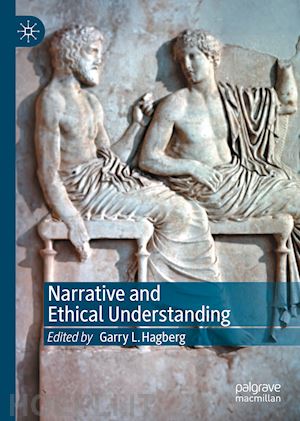

Questo prodotto usufruisce delle SPEDIZIONI GRATIS
selezionando l'opzione Corriere Veloce in fase di ordine.
Pagabile anche con Carta della cultura giovani e del merito, 18App Bonus Cultura e Carta del Docente
There has been a steady stream of articles written on the relations between ethics and the interpretation of literature, but there remains a need for a book that both introduces and significantly contributes to the field – particularly one that shows how we can think more openly and creatively about the multiform powers of ethical narrative by considering ethically significant literature.
This volume offers an analytically acute and culturally rich way of understanding how it is that we can productively think philosophically about the narrative structures that describe our ethical lives and what kind of distinctive conceptual, and in some cases personal, progress we can make by doing so. Given the extremely widespread interest in ethical issues, this volume will strike resonant chords far and wide on arrival, while offering something new in bringing together the study of long-form narrative, the language of moral psychology, and detailed literary case studies.
Given the vast expansion of narrative studies in recent years, the time for just such a volume is right.
1.Introduction: Layers of Understanding and Long-Form Narrative, Garry L. Hagberg, Part 1. To Focus on Ethical Vision rather than Moral Action.- 2. From Wittgenstein to Homer: Ethics, ‘World-Pictures,’ and Iliadic Time, Carl Humphries.- 3. Murdoch and Gilead: John Ames as a Model of Murdochian Virtue, Cathy Mason.- 4. Patricia Highsmith’s Kierkegaardian Fiction, Don Adams.- Part 2. Self-Narration, Self-Deception, and Self-Critique.- 5. Consciousness, Beckett and the (Un)Aware Being: Krapp’s and Winnie’s Wobbly Mindfulness Under the Lens of Phenomenology, Stefano Rossi.- 6. Self-deception and Self-narration: Linklater’s Tape, Zeynep Talay Turner.- 7. Shame and Self-Abasement: Bernard Williams, Kant, and J.M. Coetzee, Ana Falcato .- Part 3. Layers of Understanding: Responsibility Reconsidered.- 8. Orwellian Responsibility, Peter Brian Barry.- 9. Kant, the Karamazovs, and Hitler’s Pawn, Samuel Kahn.- 10. Storm Jameson’s Phenomenology of Place in The Hidden River, Robert Lance Snyder.- Part 4. Unobvious Forms of Moral Progress.- 11. Just Sex in Heller’s Catch-22?,James A. Baker and Zenon Culverhouse.- 12. Imperfect Fiction and Criticism im Stillstand: A Reading of The Mill on the Floss, Daniele Niedda.- 13. Listening to the Dead: Exploring the Differend in Margaret Atwood’s Penelopiad, Catherine MacMillan.- Part 5. Against Oversimplification.- 14. We all have Plague: Human Nature and Decency in Camus’ The Plague, Hayden Kee.- 15. Wallace Stevens’ Poetic Realism: The Only Possible Redemption, David Kleinberg-Levin.- 16. The Godfather III as an Essay in Long-Arc Ethical Understanding, Garry L. Hagberg.
Garry L. Hagberg is the James H. Ottaway Professor of Philosophy and Aesthetics at Bard College and Editor of the journal Philosophy and Literature. He is presently completing three new books: Consciousness Portrayed: Seven Case Studies in Philosophical Literature; The Mind on Screen: Seven Case Studies in Philosophical Film; and Art and Meaning: On Artworks and their Implications.











Il sito utilizza cookie ed altri strumenti di tracciamento che raccolgono informazioni dal dispositivo dell’utente. Oltre ai cookie tecnici ed analitici aggregati, strettamente necessari per il funzionamento di questo sito web, previo consenso dell’utente possono essere installati cookie di profilazione e marketing e cookie dei social media. Cliccando su “Accetto tutti i cookie” saranno attivate tutte le categorie di cookie. Per accettare solo deterninate categorie di cookie, cliccare invece su “Impostazioni cookie”. Chiudendo il banner o continuando a navigare saranno installati solo cookie tecnici. Per maggiori dettagli, consultare la Cookie Policy.